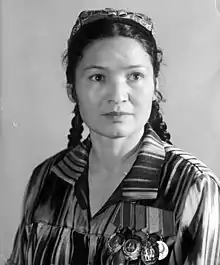Sora Eshontoʻrayeva Сара Ишантураева | |
|---|---|
 | |
| Born | 8 November [O.S. 26 October] 1911 |
| Died | September 8, 1998 (aged 86) |
| Spouse | Abror Hidoyatov |
| Awards |
|
Sora Abdurahmonovna Eshontoʻrayeva (Russified form Sara Ishanturaeva) (Uzbek: Sora Abdurahmonovna Eshontoʻrayeva, Сора Абдураҳмоновна Эшонтўраева, Russian: Сара Абдурахмановна Ишантураева, romanized: Sara Abdurakhmanovna Ishanturaeva; 8 November [O.S. 26 October] 1911 — 8 September 1998) was a Soviet and Uzbek actress. She was one of the first actresses of the Uzbek SSR to gain national prominence. She was described as a "pearl of the Uzbek scene".[1]
Early life
Eshontoʻrayeva was born on 8 November [O.S. 26 October] 1911 to an Uzbek peasant family in Beshbuloq village. After the death of her father when she was very young, her mother gave away her and two of her siblings to be raised by foster parents.[1] In her youth she attended the Zeb-un-Nissa boarding school for girls in Tashkent, where she began acting in plays.[2] When she was only nine years old she had to start wearing a paranja, and later was bethrothed to a neighbor, but she soon abandoned wearing the face-veil and eventually married fellow artist Abror Hidoyatov.[3][4][5]
She left Uzbekistan in 1924 as part of a group of 24 Uzbek theater students chosen to study in Moscow.[6] The students would later form the Hamza Drama Theater.[7] The group returned to Uzbekistan in 1927, where they were in danger of being attacked by religious fanatics for their encouragement of unveiling. Several of Eshontoʻrayeva's colleagues were murdered by religious fanatics, including Tursunoy Saidazimova who was killed when the group was on tour in Bukhara in 1928,[8] followed by the murder of Hamza in Shohimardon in 1929.[9][10]
Family
Husband - Abror Hidoyatov (1900-1958), theater actor. People's Artist of the USSR (1945)
Son - Goga Hidoyatov (1930-2015), historian, professor, doctor of historical sciences. Honored Worker of Science of the Republic of Uzbekistan.[11]
Granddaughter - Nigora Gogovna Hidoyatova (b. 1964), entrepreneur, candidate of historical sciences, public figure.[12]
Granddaughter - Nodira Gogovna Hidoyatova (b. 1967), entrepreneur, public figure, leader of the coalition "Sunny Uzbekistan".
Career
Having graduated theater school and relocated to Samarkand in 1927, Eshontoʻrayeva's acting career took off by the 1930s. She played lead roles in major plays, including Tursunoy in the play Hujum and Beatrice in The Servant of Two Masters. She went on to act as the lead female protagonist in many more productions at the theater, which included both new Uzbek plays by playwrights such as Hamza and Kamil Yashin as well as old classics such as Hamlet by Shakespeare, in which she played the role of Ophelia. From 1946 to 1955 and 1981 to 1985, she served as chairman of the board of the Theater Society of the Uzbek SSR. She also appeared in several films.[13][14]
In addition to her work as an actress, Eshontoʻrayeva was active in politics. She became a member of the Communist Party in 1939. She was also a member of the Supreme Soviet of the Uzbek SSR, a member of the Central Committee of the Communist Party of the Uzbek SSR, a delegate to the 19th Congress of the Communist Party, and a deputy in the Supreme Soviet of the USSR from the 2nd to 4th convocations (1946 to 1958). She also served as chairman of the board of the Uzbek branch of the Soviet Peace Foundation.[15][16][17]
Eshontoʻrayeva died in Tashkent on 8 September 1998 and was buried in the Chigatoy cemetery.[14]
Awards
- People's Artist of the Uzbek SSR (1937)
- People's Artist of the USSR (1951)
- Stalin Prize (1949)
- USSR State Prize (1977)
- State Hamza Prize (1967)
- Two Order of Lenin (1945 and 1971)
- Order of the October Revolution (1991)
- Order of the Red Banner of Labor (1937, 1950, 1951, 1957, and 1959)
- Order of Friendship of Peoples (1981)
- Order of the Badge of Honor (1939)
- Medal "For Distinguished Labour" (1944)
- Sogʻlom Avlod Uchun Order (1993)
- Order of Outstanding Merit (2004, posthumously)
See also
References
- 1 2 Ҳамза Ҳакимзода Ниёзий номли санъатшунослик институти; Институт искусствознания имени Хамзы Хаким-заде Ниязи (1957). Государственный ордена Ленина академический театр драмы имени Хамзы (in Russian). Гос. изд-во худож. лит-ры, УзССР.
- ↑ Деятельность Компартии Узбекистана по усилению социальной активности женщин: сборник документов и материалов, 1959-1975 гг (in Russian). Узбекистан. 1986.
- ↑ История СССР с древнейших времен до наших дней (in Russian). Изд-во "Наука". 1971.
- ↑ Перцева, Татьяна (2022-05-15). Город уходит в тень (in Russian). Litres. ISBN 978-5-04-359440-2.
- ↑ Leonidov, Oleg (1948). An Actress of the East. USSR Information Bulletin.
- ↑ История узбекской советской литературы: в пяти томах, 1917-1985 (in Russian). Izd-vo "Fan" Uzbekskoĭ SSR. 1987. ISBN 978-5-648-00192-3.
- ↑ Vershinina, I (1952). "Судьба акртисы". Ogonyok (47).
- ↑ Karimov, N. (1979). Ḣamid Olimzhon: shoir ḣäeti va izhodidan lavḣalar (in Uzbek). Ŭzbekiston LKSM markaziĭ komiteti "Ësh gvardii︠a︡" nashriëti.
- ↑ Nosirova, Halima (1962). Солнце над Востоком: записки актрисы. Литературная запись Наталии Пентюховой (in Russian). Молодая гвардия.
- ↑ Родина советская (in Russian). Изд-во политической лит-ры. 1964.
- ↑ "Личный сайт Гоги Абраровича Хидоятова". goga-hidoyatov.narod.ru. Retrieved 2023-11-06.
- ↑ "Личный сайт Гоги Абраровича Хидоятова". goga-hidoyatov.narod.ru. Retrieved 2023-11-06.
- ↑ Искусство кино (in Russian). Изд. Союза работников кинематографии СССР. 1955.
- 1 2 "Эшонтўраева Сора Абдураҳмоновна" OʻzME; Қизилқумит—Ҳўрмуз. 11-jild. Toshkent, 2005-yil
- ↑ Театральная жизнь (in Russian). 1972.
- ↑ Театральная энциклопедия (in Russian). Советская энциклопедия. 1961.
- ↑ Obshchestvennye muzei Uzbekistana (in Russian). Izd-vo "Fan" Uzbekskoĭ SSR. 1988. ISBN 978-5-648-00184-8.